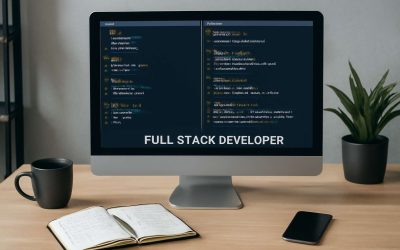Understanding the Role of a Full Stack Developer
Definition and Scope – Exploring what a full stack developer does and their importance in modern software development
In the rapidly evolving realm of software development, full stack developers have become the linchpin that holds projects together. Their role is a captivating blend of artistry and technical prowess, encompassing both front-end aesthetics and back-end functionality. These professionals are the ultimate problem solvers, bridging the gap between user experience and server-side logic with seamless finesse. It’s no exaggeration to say that a full stack developer’s qualifications extend beyond mere coding skills—they embody versatility, adaptability, and a keen understanding of diverse technologies.
The scope of a full stack developer’s responsibilities is broad, often requiring mastery of multiple programming languages, frameworks, and tools. They oversee the entire development cycle, from designing intuitive interfaces to managing databases and deploying applications. This comprehensive skill set makes them invaluable in modern software development, especially when agility and innovation are paramount. A strong foundation in full stack developer qualifications ensures they can navigate complex projects with confidence and deliver robust, scalable solutions.
Key Responsibilities – Overview of typical duties and project involvements
In the realm of digital wizardry, a full stack developer’s role is nothing short of enchanting. Their key responsibilities weave together the intricate tapestry of user interfaces and server-side logic, ensuring a seamless experience from start to finish. These professionals are tasked with building, testing, and maintaining entire applications — a feat that demands a mastery of both front-end aesthetics and back-end architecture.
Typically, a full stack developer’s duties involve designing intuitive interfaces that captivate users, while simultaneously managing databases and server configurations behind the scenes. Their project involvement often spans from initial conception to deployment, requiring a versatile skill set that can adapt to the shifting sands of technology. Some of their core tasks include:
- Developing responsive web pages with HTML, CSS, and JavaScript frameworks
- Constructing robust back-end services using server-side languages like Node.js, Python, or Ruby
- Managing databases such as MySQL, MongoDB, or PostgreSQL for data integrity and scalability
- Implementing APIs for seamless communication between front-end and back-end systems
In essence, a full stack developer’s qualifications extend beyond mere coding—they embody adaptability, problem-solving finesse, and a deep understanding of multiple technologies. Their role is pivotal in ensuring that every piece of the puzzle fits perfectly, creating applications that are both powerful and user-friendly—truly a modern marvel in software development!
Differences from Specialized Developers – Comparing full stack developers with front-end and back-end specialists
In the bustling universe of software development, full stack developers are the Swiss Army knives—versatile, adaptable, and a tad elusive. They’re often mistaken for their more specialised counterparts, the front-end and back-end developers, but in reality, their qualifications are a different beast altogether. While front-end specialists excel at crafting visually stunning interfaces, and back-end maestros focus on server logic and databases, full stack developers juggle both with impressive finesse.
Unlike their specialised peers, full stack developer qualifications demand a broad spectrum of skills—think of it as being fluent in multiple dialects of the tech language. They need to understand user experience design, server architecture, and database management all at once. This multifaceted expertise allows them to oversee entire projects, ensuring that the front and back ends of an application harmonise seamlessly. For those wondering about the difference, here’s a quick rundown:
- Front-end developers focus on the client side, crafting responsive and engaging interfaces.
- Back-end developers dive into server-side logic, database management, and API integration.
- Full stack developers combine all these elements, wielding qualifications that span both domains.
In essence, the full stack developer qualifications are the ultimate badge of versatility—an essential asset in the modern, fast-paced tech landscape where adaptability is king. They’re not just coding wizards; they’re the maestros orchestrating the entire symphony of application development.
Essential Technical Skills for Full Stack Developers
Front-End Development Skills – Proficiency in HTML, CSS, JavaScript, and frameworks like React or Angular
In the intricate dance of modern software creation, a full stack developer qualifications extend beyond mere familiarity; they demand mastery of the front-end’s finesse and the back-end’s resilience. At the heart of this expertise lies a deep understanding of HTML, CSS, and JavaScript—tools that shape the user experience with precision and elegance. These core skills are the palette from which a full stack developer crafts intuitive interfaces and seamless interactions.
Proficiency in frameworks such as React or Angular elevates their capability, allowing them to build dynamic, responsive applications that feel almost alive. The ability to integrate these technologies smoothly into larger development ecosystems is what marks a true full stack developer. Often, this proficiency is complemented by knowledge of version control, debugging, and responsive design—each vital for navigating the complex landscape of full stack development. When these technical skills coalesce, they forge the foundation of the comprehensive qualifications needed for excellence in this demanding role.
- HTML and CSS for structure and style
- JavaScript and modern frameworks like React or Angular for interactivity
- Version control systems such as Git
- Responsive design principles to ensure accessibility across devices
Back-End Development Skills – Experience with server-side languages such as Node.js, Python, Ruby, or Java
Behind every seamless app or website lies a robust back-end, where the magic of server-side programming takes place. For a full stack developer, mastering back-end development skills is as vital as their front-end expertise. Experience with server-side languages like Node.js, Python, Ruby, or Java forms the backbone of their technical qualifications, enabling them to build scalable, secure, and efficient systems. These languages serve as the engine driving complex data processing, authentication, and business logic.
Understanding how to connect these server-side technologies with databases and APIs is crucial. A full stack developer should be familiar with database management systems such as MySQL, PostgreSQL, or MongoDB, and how to optimise data queries for performance. When combined with their knowledge of server-side programming, these skills create a comprehensive profile of full stack developer qualifications, ensuring they can manage the entire development lifecycle with confidence.
- Designing and implementing server-side architecture
- Managing database interactions and data security
- Integrating third-party services via APIs
Database Management – Knowledge of SQL and NoSQL databases like MySQL, PostgreSQL, MongoDB
In the ever-evolving landscape of software development, a full stack developer qualification isn’t just a badge of honour—it’s a passport to building entire digital worlds from scratch. Central to this skill set is a robust understanding of database management. After all, without a reliable database, even the most beautifully coded app risks turning into digital dust. Mastery over SQL and NoSQL databases like MySQL, PostgreSQL, and MongoDB is crucial for managing data efficiently and securely.
These databases are the backbone of dynamic applications, enabling developers to store, retrieve, and manipulate data with finesse. An accomplished full stack developer should be comfortable crafting optimised queries and designing schemas that handle increasing data loads without breaking a sweat. Whether it’s organising relational data with SQL or embracing the flexibility of NoSQL systems, these database management skills are integral to full stack developer qualifications.
- Designing scalable database architectures
- Ensuring data security and integrity
- Integrating databases seamlessly with server-side logic
In short, database management isn’t just a technical skill—it’s a fundamental component that transforms a competent coder into a full-fledged full stack developer. With these capabilities, they can confidently oversee the entire data lifecycle, from initial concept to final deployment, ensuring systems are both resilient and performant.
Version Control and Collaboration Tools – Familiarity with Git, GitHub, and CI/CD pipelines
In the realm of full stack developer qualifications, mastery over version control and collaboration tools is paramount. Nearly every software project today hinges on the seamless orchestration of teamwork, and that’s where Git, GitHub, and CI/CD pipelines come into play. These tools are not just about keeping track of changes; they are the backbone of modern development workflows, enabling developers to work concurrently without chaos reigning supreme.
A proficient full stack developer should be comfortable navigating Git commands, managing repositories on GitHub, and implementing continuous integration and deployment pipelines. This ensures that updates are smoothly integrated, bugs are caught early, and releases are consistently reliable—traits that elevate a developer from competent to extraordinary. After all, in a fast-paced digital landscape, the ability to collaborate effectively and automate processes is as vital as writing clean code. These capabilities are essential components of full stack developer qualifications, fostering both agility and resilience within complex projects.
Basic DevOps Skills – Understanding of cloud services, containerization, and deployment processes
In today’s fast-changing tech landscape, a full stack developer’s skill set must extend well beyond basic coding. Essential technical skills include a solid understanding of DevOps practices—crucial for streamlining development and deployment. Knowledge of cloud services like AWS or Azure enables seamless scalability, while familiarity with containerisation tools such as Docker or Kubernetes simplifies environment management. These skills empower developers to orchestrate complex deployment processes, ensuring that applications run reliably across different platforms.
Moreover, a grasp of deployment pipelines—integrating continuous integration and continuous deployment (CI/CD)—is indispensable. This enables rapid iteration, early bug detection, and consistent releases, which are vital in competitive markets. A well-rounded full stack developer qualifications portfolio also involves familiarity with infrastructure automation tools, making the entire process more efficient. This combination of technical prowess fosters resilience and agility, hallmarks of truly effective development teams.
- Understanding of cloud platforms like AWS, Azure, or Google Cloud
- Proficiency with containerisation technologies such as Docker and orchestration tools like Kubernetes
- Experience setting up and managing CI/CD pipelines using Jenkins, GitLab CI, or CircleCI
- Basic knowledge of infrastructure as code tools like Terraform or Ansible
Ultimately, these foundational DevOps skills are no longer optional—they are integral to meeting the rigorous demands of modern full stack developer qualifications. They ensure that projects are not only functional but also scalable, maintainable, and resilient against the unpredictable nature of today’s digital world.
Core Educational and Certification Qualifications
Formal Education – Degrees in Computer Science, Software Engineering, or related fields
In the fiercely competitive landscape of modern software development, possessing the right full stack developer qualifications can be the defining factor between a mediocre project and a groundbreaking digital experience. Formal education remains a cornerstone—most employers seek candidates with degrees in computer science, software engineering, or related fields. These academic credentials lay a solid foundation, equipping aspiring developers with fundamental programming principles, algorithms, and system architecture knowledge. Such qualifications not only demonstrate technical competency but also reflect a commitment to the craft that employers highly value.
Beyond degrees, specialised certifications in areas like cloud computing, web development, or database management can significantly bolster a candidate’s profile. These certifications serve as tangible proof of expertise, often making the difference in a candidate’s marketability. For those seeking to stand out in the crowded arena of full stack developer qualifications, continuous learning through formal education and industry-recognised certifications is essential. It’s this blend of academic achievement and specialised certification that truly unlocks the potential for innovation and leadership in full stack development roles.
Professional Certifications – Certifications such as AWS Certified Developer, Microsoft Certified, or Google Cloud certifications
In the competitive realm of modern software development, standing out as a full stack developer often hinges on a carefully curated blend of core educational and professional certifications. While a solid degree in computer science or software engineering provides the foundational knowledge, specialised certifications act as the turbocharge for your career trajectory. These credentials not only validate your technical prowess but also signal a commitment to continuous professional growth—an attribute highly prized by employers.
Certifications such as AWS Certified Developer, Microsoft Certified: Azure Developer Associate, and Google Cloud certifications are increasingly recognised as benchmarks of cloud competency. They demonstrate your ability to craft scalable, reliable applications in cloud environments—an essential skill for full stack developers navigating the complexities of modern infrastructure. For those eager to deepen their expertise, acquiring multiple industry-recognised certifications can be a game-changer.
- Specialised cloud certifications like AWS, Microsoft Azure, and Google Cloud
- Web development certifications covering frameworks such as React, Angular, or Vue.js
- Database management credentials for SQL and NoSQL platforms like PostgreSQL, MongoDB, or DynamoDB
In essence, a strategic combination of formal education and targeted certifications elevates a full stack developer’s credentials, unlocking new opportunities for innovation and leadership in an ever-evolving digital landscape. These qualifications are more than just proof of skill—they are a testament to a developer’s dedication to mastering every facet of the full stack, from front-end finesse to back-end robustness.
Additional Training and Bootcamps – Specialized coding bootcamps and online courses that boost credentials
In an industry driven by relentless innovation, the pursuit of full stack developer qualifications often becomes a quest for mastery over both the visible and hidden layers of technology. Beyond formal education, specialised training programmes and intensive bootcamps serve as transformative catalysts, sharpening skills that are crucial in today’s competitive landscape. These courses not only deepen understanding but also demonstrate a commitment to continuous growth—an attribute that employers cherish.
Many aspiring full stack developers turn to online platforms and coding bootcamps that specialise in modern frameworks, cloud integration, and advanced database management. These immersive experiences often include hands-on projects, which are invaluable for translating theory into practical skills. For those seeking to elevate their credentials, structured programmes provide a clear pathway to mastering complex concepts such as DevOps practices, containerisation, and deployment pipelines.
- Specialised coding bootcamps focusing on React, Angular, or Vue.js
- Cloud computing courses covering AWS, Azure, or Google Cloud
- Database management certifications in SQL, NoSQL, or graph databases
Such targeted training complements core educational foundations and enhances the overall profile of a full stack developer. It’s not merely about acquiring certifications but cultivating an adaptive mindset—one that embraces lifelong learning and the relentless evolution of technology. This dedication to expanding one’s skill set ultimately defines the depth of full stack developer qualifications and underscores a developer’s readiness to innovate in a rapidly shifting digital world.
Practical Experience and Soft Skills
Hands-On Project Experience – Building a portfolio with real-world full stack projects
In the realm of full stack developer qualifications, practical experience often shines brighter than theoretical knowledge alone. Building a robust portfolio filled with real-world projects demonstrates not only technical prowess but also a keen understanding of user needs and business objectives. By engaging in hands-on project experience, aspiring full stack developers can showcase their ability to craft seamless, end-to-end solutions that marry front-end finesse with back-end robustness.
Beyond technical skills, soft skills such as problem-solving, adaptability, and effective communication are vital. A full stack developer must navigate complex challenges, often acting as a bridge between diverse teams. Developing these skills through collaborative projects and real-world scenarios enriches their qualifications and fosters a comprehensive approach to software development.
- Engaging in open-source contributions to demonstrate versatility and community involvement.
- Creating diverse projects that span multiple technologies to showcase breadth and depth of knowledge.
- Participating in hackathons or coding bootcamps to simulate real-world problem-solving under pressure.
Such experiences not only serve as tangible proof of competence but also cultivate the soft skills that elevate a developer from competent to exceptional. In the competitive landscape of full stack developer qualifications, hands-on project experience remains a cornerstone of professional growth and recognition.
Problem-Solving Abilities – Strong analytical skills to troubleshoot and resolve issues
In the realm of full stack developer qualifications, practical experience acts as the enchanted armour that distinguishes the adept from the merely proficient. Engaging in real-world projects allows aspiring developers to hone their problem-solving abilities, transforming abstract concepts into tangible solutions. Strong analytical skills are the cornerstone of troubleshooting and resolving complex issues swiftly, ensuring seamless performance across the entire tech stack.
Beyond technical prowess, soft skills such as adaptability and effective communication forge the path to mastery. A full stack developer often becomes the nexus between diverse teams, translating technical jargon into comprehensible dialogue and vice versa. Developing these interpersonal skills through collaborative projects or open-source contributions elevates one’s candidacy, showcasing versatility and dedication.
For those eager to demonstrate their breadth of knowledge, participating in hackathons or creating varied projects that span multiple technologies can be particularly impactful. These endeavours not only validate technical competencies but also cultivate resilience and ingenuity—traits essential for achieving exemplary full stack developer qualifications.
Communication Skills – Effective collaboration with cross-functional teams
Practical experience is the backbone of full stack developer qualifications, transforming theoretical knowledge into tangible expertise. Immersing oneself in real-world projects sharpens problem-solving skills, enabling developers to navigate complex issues with agility and confidence. It’s one thing to understand the basics; it’s another to troubleshoot seamlessly when faced with unexpected bugs or system failures.
Furthermore, soft skills such as communication and collaboration are often the unseen forces that elevate a developer from competent to exceptional. Working alongside cross-functional teams requires clarity in conveying technical concepts and listening intently to diverse perspectives. This synergy fosters innovation and accelerates project delivery. For example, engaging in collaborative tools like Git and CI/CD pipelines nurtures effective teamwork, which is vital in modern development environments.
In the realm of full stack developer qualifications, demonstrating your ability to bridge technical domains through excellent communication is just as crucial as coding prowess. It’s these nuanced interpersonal skills that often distinguish a good developer from a truly versatile professional—ready to tackle the multifaceted challenges of today’s tech landscape.
Adaptability and Continuous Learning – Keeping pace with rapidly evolving technologies
In the fast-paced realm of modern software development, practical experience isn’t just a nice-to-have; it’s the secret sauce that turns theory into mastery. A full stack developer qualification isn’t solely about memorising syntax or memorising frameworks; it’s about immersing oneself in real-world projects that challenge problem-solving prowess and adaptability. Nothing beats the thrill of debugging a stubborn bug at 2 a.m. — it’s these moments that forge true expertise.
Soft skills, particularly adaptability and continuous learning, are the silent heroes in a full stack developer’s arsenal. Technologies evolve faster than a caffeinated squirrel, and staying ahead requires a commitment to ongoing education. Mastery of tools like Git and CI/CD pipelines isn’t enough; a developer must also possess the agility to pivot with emerging trends and new frameworks. For example, engaging with online courses or specialised bootcamps can dramatically elevate a developer’s credentials, ensuring they remain relevant amidst the tidal wave of innovation.
- Embrace new languages and frameworks as they emerge, turning the unfamiliar into your next weapon in the coding arsenal.
- Participate in hackathons or open-source projects to sharpen problem-solving skills and stay connected with industry shifts.
Ultimately, the hallmark of a stellar full stack developer qualification isn’t just technical knowledge but the ability to adapt seamlessly and learn relentlessly. In a world where yesterday’s cutting-edge is tomorrow’s legacy, those who keep evolving are the ones who truly thrive.
Additional Attributes and Qualifications
Understanding of UI/UX Design – Basic knowledge of user experience principles
A well-rounded full stack developer qualification extends beyond technical skills alone. An often overlooked but vital attribute is an understanding of UI/UX design principles. Basic knowledge of user experience ensures that developers can craft interfaces that are intuitive and engaging, ultimately enhancing the overall functionality of the application. This understanding helps bridge the gap between aesthetic appeal and technical feasibility, leading to better product outcomes.
In addition, possessing a keen eye for usability and accessibility can set a developer apart — making their work more inclusive and user-friendly. For those seeking to deepen their full stack developer qualifications, familiarising themselves with foundational UI/UX concepts such as wireframing, prototyping, and user-centred design is invaluable. Incorporating these attributes into their skill set not only broadens their expertise but also aligns with industry demands for versatile and empathetic developers who can view projects from multiple perspectives.
Knowledge of Testing Frameworks – Experience with unit and integration testing tools
In the intricate dance of modern software development, a full stack developer must possess more than just coding prowess. An often underestimated yet crucial attribute is a solid understanding of testing frameworks. Experience with unit and integration testing tools not only ensures code quality but also fortifies the reliability of the entire application. This capability enables developers to detect bugs early, streamline debugging, and enhance overall product stability.
Knowledge of testing frameworks such as Jest, Mocha, or Selenium often distinguishes seasoned full stack developers from novices. These tools facilitate automated testing, which is vital for maintaining consistency across complex projects. A well-rounded full stack developer qualifications include familiarity with these frameworks, allowing them to deliver robust, dependable solutions that meet industry standards. This layered expertise ensures the development process remains smooth, even amid evolving project requirements.
Business and Project Management Skills – Understanding project workflows and client requirements
Beyond technical prowess, a successful full stack developer possesses a suite of business and project management skills that set them apart. Understanding project workflows and client requirements is essential for delivering solutions that truly meet user needs and align with business goals. This knowledge ensures that development efforts remain focused, efficient, and adaptable to changing priorities.
Effective communication and organisational abilities often translate into smoother collaboration with cross-functional teams. Being able to translate technical concepts into plain language helps bridge the gap between developers and stakeholders. Moreover, familiarity with project management tools and methodologies, such as Agile or Scrum, enhances a full stack developer’s capacity to track progress and manage deliverables confidently.
Many organisations value a comprehensive skill set, which is why some full stack developer qualifications include formal training in business analysis or project coordination. These additional attributes not only improve project outcomes but also demonstrate a developer’s commitment to delivering value-driven solutions. Ultimately, the blend of technical expertise and project management competence defines the holistic skill set that modern full stack developers need to thrive in today’s digital landscape.
Language and Framework Proficiency – Mastery of multiple programming languages and frameworks
Mastery of multiple programming languages and frameworks is a hallmark of exceptional full stack developer qualifications. It’s not merely about knowing a handful of tools, but about possessing a versatile command over diverse technologies, enabling seamless integration across the entire development spectrum. Whether it’s fluency in JavaScript frameworks like React or Angular, or back-end languages such as Python or Ruby, a true full stack developer navigates these domains with instinctive ease.
Familiarity with a variety of frameworks and languages often translates into a more adaptable, resilient developer. Here’s an illustration: many top-tier professionals boast proficiency in both SQL and NoSQL databases—like MySQL and MongoDB—allowing them to craft solutions tailored precisely to project needs. This breadth of knowledge ensures that they can pivot swiftly when project requirements shift, embodying the essence of comprehensive full stack developer qualifications.
- Proficiency in front-end frameworks like React or Angular
- Experience with server-side languages such as Node.js or Python
- Understanding of database management systems, both SQL and NoSQL
- Knowledge of version control systems like Git and collaboration tools
- Familiarity with deployment pipelines and basic DevOps practices
In an environment where technology evolves at a relentless pace, possessing a wide-ranging language and framework proficiency becomes more than a skill—it transforms into a moral compass guiding an individual through the labyrinth of innovation. These core capabilities are woven into the fabric of full stack developer qualifications, ensuring they remain not just relevant, but indispensable in today’s digital ecosystem.




0 Comments